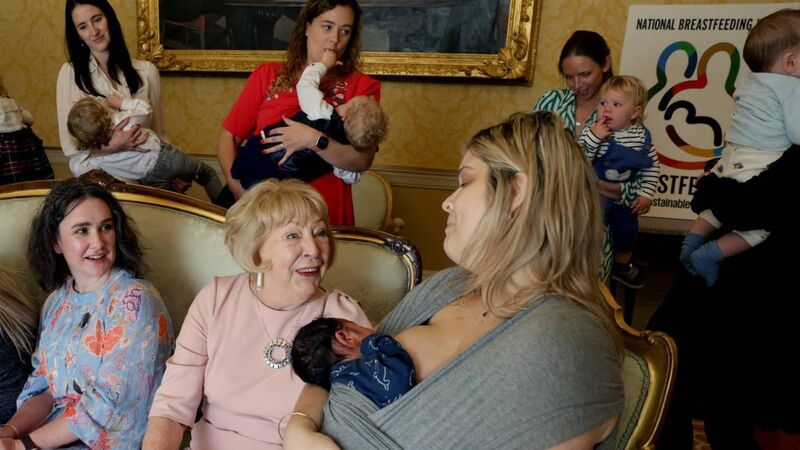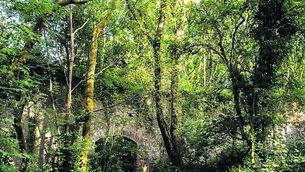Kathriona Devereux: Hitting on a winning formula to help breastfeeding mums

Usually, these volunteers have come to this role because they themselves got much-needed support when the going got tough in their breastfeeding journey. They want to give something back.
They know the value of well-timed advice and how it can radically alter the course of a breastfeeding experience. So, they give up their valuable free time to attend training days.
They learn what the latest scientific breastfeeding research tells us and how to listen and support. And now - weekly, fortnightly, monthly - they give their time to create a supportive space for the early days, weeks, and years of motherhood.
Soon, the tired and huddling masses of mothers and babies arrive. They push buggies, haul car seats, and tote snug babies in slings. Many are man-marking a toddler. All are delighted to have a place where little ones, lactation and laments over lost sleep are welcome.
Despite what media reports and unhelpful anecdotes might suggest, not all breastfeeding experiences are torturous ordeals. It’s not easy - especially the first-time round - but some mothers come to breastfeeding support groups not because their nipples hurt but simply because they want the chat and camaraderie of others in the same boat. That, and the unlimited tea, sympathy - and biscuits.
‘There is always a breastfeeding solution to a breastfeeding problem’ is the motto, and mothers often leave buoyed by the advice and encouragement these coffee mornings provide.
When a problem is beyond the remit of a support group, mothers are directed to lactation consultants, public health nurses, and other healthcare professionals, all dedicated to helping breastfeeding families.
It is the 40th week of the year, and with a nod to 40 weeks of gestation, National Breastfeeding Week is upon us again. Seven days in the calendar when we cheer breastfeeding, urge everyone to support the most natural thing in the world, and then go back to the status quo of being the country with one of the lowest breastfeeding rates in the world.
Only 63% of babies in Ireland are breastfed at birth. Countries like the U.S, Australia, and Sweden achieve initiation rates of more than 90%.
This huge disparity is not a quirk of anatomy; it is about societal norms and values.
Decisions around infant feeding are made by parents who are influenced by wider society, and Ireland has a formula feeding culture.
Like other high-income countries, breastfeeding rates plummet in the days, weeks, and months after birth. Because Ireland’s rates are so low already, a much higher percentage of women and babies are missing out on the health protection that breastfeeding delivers now and later in life.
All of which is why National Breastfeeding Week is so important, to remind the public and policymakers of the issue.
For the past 11 years, one of the highlights of the week has been the ‘Latching On’ Morning at Áras an Uachtaráin, hosted by Sabina Higgins. The coffee morning is a ‘thank-you’ to the breastfeeding support community and a call to action for society.
The ‘Latching On’ event is a fancier occasion than the local library gathering. A battalion of buggies clogs the grand hallway and mothers and babies are bedecked in their finest.
As a Cuidiú breastfeeding counsellor, I had the honour of attending on one occasion. Mrs Higgins made a speech commending the efforts of the small army of breastfeeding advocates trying to make breastfeeding the norm for the health and wealth of the country.
President Higgins made an appearance, encouraging those gathered to keep on keeping on - obviously said much more eloquently than that.
The Higgins family ‘get’ breastfeeding. President Higgins has spoken at National Breastfeeding Week events in the past, asking “why can governments not see that beyond the direct benefit to the health of children and mothers, which is the most important aspect, there is the possibility of avoiding the spending of billions on later health issues that could have been avoided had breastfeeding been recognised as the sustainable approach, as a right, and as a promoted health policy?”
Why indeed.
The unrelenting advertising of formula and follow-on milks - increasingly via bespoke digital marketing to pregnant and lactating women - is shown to undermine breastfeeding. President Higgins has not been afraid to call out the formula industry.
“There is the fact that some largely unaccountable corporations with vast resources of finance for lobbying, and abuse of advertising, are active in defending what they see as a significant and growing market, one that they see as limitless,” he said.
“Unable to demolish the science and research that shows that breast-feeding is best, they seek to confuse with advertisements that speak of ‘follow-on’ products that are in reality contradictory to what breastfeeding principles envisage or stand for.”
As I said, the Higgins family ‘get’ breastfeeding. Senator Alice-Mary Higgins was a resolute supporter of legislation to curb the aggressive marketing of infant formula, legislation which is yet to be enacted by Coimisiún na Meán.
As President Higgins’ time in the Áras draws to a close, let me take a moment to say míle buíochas to Mrs Higgins and her husband for their encouragement and praise.
Like many volunteering roles, breastfeeding support can be a thankless job. The reward is seeing mothers in six- or 12-months, still breastfeeding their baby, knowing they are likely to breastfeed their subsequent babies. Knowing they are likely to offer support and encouragement to their sisters, friends, and work colleagues when the time comes.
Each act of support causes a positive ripple. The support of President and Sabina Higgins has rippled from the Phoenix Park around the world to global infant feeding advocates heartened to see a president stand up for a cause that is both right and necessary. It means a lot.







 App?
App?




